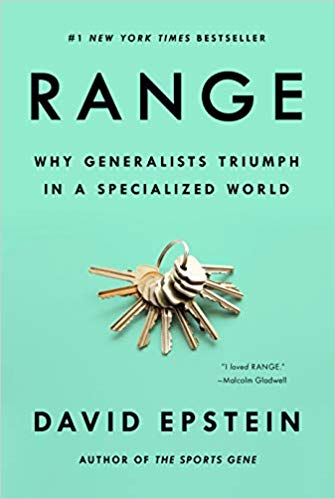 I’m a generalist. While I specialize in my career field as a writer, speaker, and researcher, I have to use a wide variety of muscle memory to make that happen (for instance, the skills that help you dig into a large set of data are different than the skills it takes to share that data from the stage).
I’m a generalist. While I specialize in my career field as a writer, speaker, and researcher, I have to use a wide variety of muscle memory to make that happen (for instance, the skills that help you dig into a large set of data are different than the skills it takes to share that data from the stage).
And in an increasingly specialized world, generalists win.
This is the thesis of the book Range: Why Generalists Triumph in a Specialized World.
(Note: If you like HR book reviews I have done dozens over the last ten-plus years!)
The book is a long one, but it has so many great findings and scientific insights into what powers human performance. Plus it busts some of the key myths we all have come to believe, like “if you want to be great at something you have to specialize as early in life as possible and never do anything else,” which the author calls the Tiger option (after Tiger Woods, the legendary golfer that started playing before age five).
Six Key Ideas I Loved
- Learning to learn is more important than what you learn, at least initially. In one experiment, researchers watched students that were randomly sorted into Math I, II, and III classes. They found that the teachers that taught to the test and helped students the most in Math I created students that struggled in Math II and Math III classes. Conversely, teachers that forced students to think critically about problems and arrive at their own rational solutions performed worse in Math I but better in Math II and III. Translation: learning to learn is slower and more painful, but it leads to better long term results.Â
- Humans + Machines are better than either separately. In a chess competition, humans paired with a computer (called a “centaur” after the mythical creature that is half man, half horse) perform better than either computers or humans alone. That’s because humans are great at broad strategy and direction while computers are very good at rapid calculation and deeply validating the next activity. That mix leads to the best results (and is a core theme of my own book about why HR pros need to use AI to create a more human employee experience).
- Life is an unkind learning environment that is harsh on overly specialized people. In scientific research, a kind learning environment is one with many rules and very quick feedback, like a game of golf. You know the rules and you can see quickly if your action was good or bad. Unfortunately life is nothing like that! Very loose rules, if any, in many situations. Additionally, feedback, if it ever comes, is loaded and often biased. Generalists fare better in these unkind learning environments than specialists do.
- Students that get too specialized in their own career/research field perform worse than random on logic puzzles. If you become too rules-oriented and constrained, you try to see every problem through the myopic lens of your craft. In laymen’s terms: if you’re a hammer, ever problem looks like a nail. The problem is this creates scenarios where the things that you learn in your craft may actually make you worse at solving problems instead of better. A more diverse set of experience can help individuals solve problems better, whether at home or at work.
- Using analogies leads to better outcomes/ideas. Want to solve a problem you’ve never seen before? Use analogies to familiarize certain concepts and make them easier to relate to and understand. This creates a better set of outcomes and has been a core method for scientific breakthroughs since the early days of astronomy when scientists realized the universe doesn’t actually revolve around the Earth.
- Similar to #3 above, range (or a diversity of thought/perspective/experience) within a group can create better outcomes. One story the author tells is about two groups of scientists trying to solve the same problem. Group A is made up of a mixture of scientific disciplines (biologists, botanists, chemists, virologists, etc) and Group B is made up of a set of scientists from a single discipline. It took the second group MUCH longer to solve the problem because they didn’t have a diverse set of perspectives to examine it through. We know diversity matters and new data are coming out daily about the business benefits of diversity, but this shows in a microcosm just how this can create more value for businesses with something like better problem solving.
Highly recommend this book if you want to think more critically about how humans can perform at their best in this increasingly complex work environment.
Question: are you a generalist or a specialist? What other experiences do you have that can help you improve your work through varying generalist perspectives (example: sports, baking, child-rearing, music, volunteer work, etc.)?